Chhatarpur Christian Hospital
After struggles with infertility, Ripa conceived twins through IVF. Over 8 months into her pregnancy, she came to Chhatarpur Christian Hospital for the first time, concerned that her babies had stopped moving. The doctors gave her steroids to help the babies’ lungs mature, but within a few hours of admission, she went into preterm labor.
After an ultrasound, it was determined that the babies would need to be delivered by C-section. The operation was performed, and two tiny babies were born. But when the placenta was delivered, Ripa went into postpartum hemorrhage, and the site of the bleeding made it difficult to stop. There was no textbook solution, so the doctors used several types of sutures in an innovative attempt to save her life. Thankfully, they were successful and Ripa lived to raise her two babies.
The staff submitted a paper on their suturing method to an international forum in the hopes of helping other doctors in the same situation, and it was accepted. They will have an opportunity to present on this new technique this fall. EHA is proud to have staff who think outside the box to create solutions.
Breaking Down Barriers
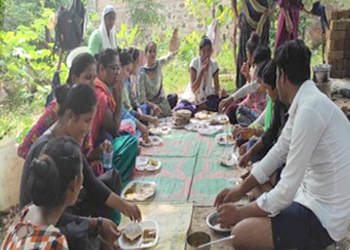
While India’s caste system may be fading in acceptability and visibility in the cities, in rural settings, it is alive and well. In the villages where EHA runs community programs, many people belong to the Dalit, or untouchable, caste, and those higher up in the social order want nothing to do with them.
The Chhatarpur Christian Hospital (CCH) community project staff have reached out to a group of youths in the village of Bedar. Many of these young people had no goals or dreams for their future. CCH staff formed a boys’ and a girls’ group to go through the Nae Disha program. This curriculum is designed to improve attitudes about mental health, gender equality, and resilience for young people in low-income settings. As the groups progressed through the material, they developed friendships with others of different castes, although some still struggled with negative feelings regarding these distinctions.
As a result of going through this curriculum, both the boys and the girls refused to marry early, even though they were strongly pressured by their parents, and most of them stayed in school. They learned the life skills of planning, making good decisions, time management, communication, and anger control. They each gained important tools to help them make their way in life.
After a year of meeting, a graduation was held for the participants. The entire group gathered to cook and eat together, effectively dissolving their cultural, caste, and gender divisions. During the feast, students from both high and low castes sat at the same table for the first time and enjoyed their celebration.
This important work that EHA is doing to break down social barriers and move toward equality for all is key to the future of India.
Complicated Surgery Saves Two Lives
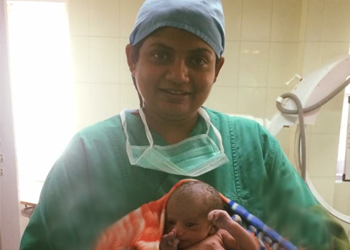
After a busy day in the outpatient department, Dr. Roopa was ready to go home. The next thing she knew, she heard the strident voice of a young pregnant woman begging to be seen by a doctor. The patient explained to Dr. Roopa that she had been turned away from the state hospital after being taken into the operating room for surgery. The doctor there had found a tumor and decided it was too risky to operate. This woman had no place to go, her blood pressure was high, and the fetal heartbeat was fluctuating. Dr. Roopa felt she had no choice but to operate.
After explaining the risks of surgery to the patient, Dr. Roopa decided to take a leap of faith and operate on the young woman. As she explored the abdomen, she found an 11-pound tumor in the way of the baby. The process was tricky, but Dr. Roopa was able to remove the tumor and then deliver the baby. Although the infant was weak for two days, he soon stabilized. Both mother and child went home well soon after. This miraculous surgery amazed the staff, and every time the mother and baby come in for follow-up, the staff are encouraged at God’s goodness.
Update on Chhatarpur Christian Hospital
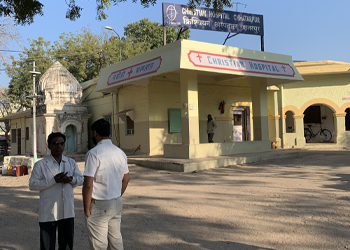
Located in Madhya Pradesh in North Central India, Chhatarpur Christian Hospital (CCH) has been in existence since 1930—that’s 93 years! The literacy rate in this area is just 65 percent, 36 percent of the people live below the poverty line of 47 rupees per day (57 cents per day), and 77 percent of the population also lives in a rural setting.
CCH meets a significant need for this community by providing low-cost, quality medical care. The hospital has 120 patient beds where 4,470 inpatients are cared for each year. The staff typically see 110 outpatients a day, and the CCH surgical team performs about 4 operations each day.
Some of the hospital’s biggest needs at this point are to upgrade their nursing school to a college of nursing per the Indian government requirements, to purchase a bus for the nursing school, and to improve and add staff housing.
Since CCH does more than 250 cataract surgeries each year, a common complication has brought about the need for one specific piece of equipment. Twenty to fifty percent of the cataract patients develop Posterior Capsular Opacification, which must be treated with a YAG Laser. Currently, CCH staff have to refer patients to another hospital 100 miles away because they do not have a YAG Laser. The cost to purchase one is $7,000.
If you feel led to help meet these needs, please click the button below.
The Making of a Farmer
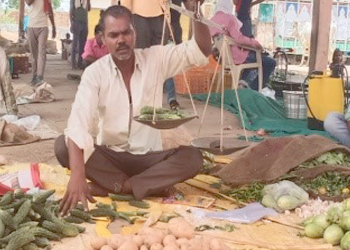
Jamna Gond lived in Bila village and struggled to provide for his family by working odd jobs. Miserable in his situation, he longed for someone to guide him to do something new to support his family.
One day Chhatarpur Christian Hospital’s (CCH) community team visited his home and spoke with him about new agriculture techniques. After looking at the land behind Jamna’s home, the team encouraged him to cultivate vegetables.
The problem was irrigation. Jamna started out carrying water from a hand pump some distance away. Then he had the idea to purchase some pipes and run water from the pump to his fields. After three months of hard work, his fields were awash with color as tomatoes, greens, and other produce flourished. Jamna was able to sell all his vegetables for $3,000, a huge sum for a struggling family in India.
Now Jamna has money to buy what he needs from the market, eat three times a day with his family, pay for his grandson’s and granddaughter’s schooling, and have an emergency fund. His life has been utterly transformed, thanks to the input from an EHA community team who cared.
A Journey from Exclusion to Inclusion
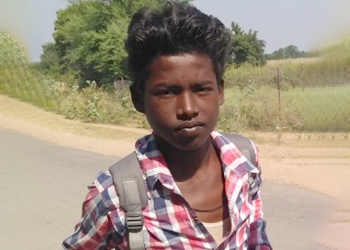
Bobby Harijan lives with his siblings and parents in Padwaha village. They are looked down upon by those in higher castes and by their own community due to their poverty. Bobby used to be humiliated by his high school classmates almost every day. He had no interest in school and could not concentrate on his studies. He sat on the very back bench, feeling isolated and rejected, and unable to express his feelings to anyone.
Then Chhatarpur Christian Hospital sent a project team to conduct a school health education program at Padwaha School, and they met Bobby. Looking at his behavior, the project officer encouraged him to enroll in their adolescent program. Bobby showed no interest, but the project officer began visiting him and encouraging him to take part in school health education presentations. It took Bobby almost a year to open up to the team.
Eventually he participated in the adolescent program and learned from the Nai Disha (New Direction) module. He also received peer educators training, which helped him build his confidence to take on a leadership role among the teens in his village.
Bobby has been instrumental in forming a new group of adolescents in Padwaha village in 2020. Now he pays attention in school and mingles with everyone. Bobby’s parents are thrilled with the change in his attitude and behavior. They have opened their home for the team to visit and pray with them. Over time, Bobby and his family have shown a keen interest in hearing the gospel stories and experiencing God’s love in their lives.
Untouchable Man Is Touched by EHA’s Care
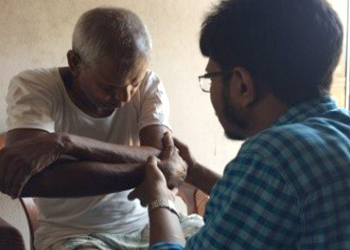
He belonged to the untouchable community. Khilaiya Ahirwar was a 65-year-old man who suffered a fall five years ago and became paralyzed on the left side of his body. With no one who knew how to help him, he was living an isolated life, bedridden and incontinent.
Then the Palliative Care Team at Chhatarpur Christian Hospital heard about Khilaiya and stepped in to help. They immediately cared for his physical needs and began to build a rapport with him and his family. The team taught his family some exercises to do with Khilaiya, and they encouraged his wife to massage his limbs with oil. Chhatarpur’s occupational therapist visited Khilaiya and gave him therapy to encourage mobility and taught him how to improve his diet for better health.
After spending time listening to his concerns about being lonely and unwanted, the team prayed with him and shared with him about God. Khilaiya is very grateful whenever the Palliative Care Team visits him, and he has begun to pray for himself and his family members. By reaching out to an “untouchable,” EHA has made all the difference in the life of this one man.
Patience and Perseverance Bring Healing
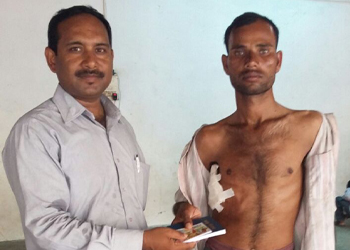
Rajesh came in to Chhatarpur Christian Hospital after suffering from chest pain, fever, and a cough for four months. Despite consulting with multiple doctors during that time, he had no idea what was wrong. After examination, the EHA doctors determined that the entire right side of his chest was filled with pus, and a tube was immediately inserted to begin to drain it. Tests showed that he had tuberculosis as well, and he was started on anti-tuberculosis medication.
Dangerously ill, Rajesh should have been rushed to thoracic surgery at a more specialized facility, but he had no means to pay for such care. Even when the EHA doctors pitched in money so that he could go to the Christian Medical College in Vellore, and the cardiothoracic doctors there agreed to operate for free, Rajesh still couldn’t make the trip because he had no relatives to travel with him. He was the sole breadwinner for his younger siblings and his ailing parents.
So Rajesh and the Chhatarpur doctors settled in for long-term treatment. After ten long months, his pus production and drainage stopped, and the doctors were able to remove the tube. During this entire time, the medical staff were able to share about God with Rajesh, and he began attending church and praying regularly. The doctors consider his healing to be a miracle, as he really needed a cardiothoracic surgeon to manage his case. But God healed Rajesh, and today he attends the local church and is an active participant in their youth meetings.
A Couple Is Blessed
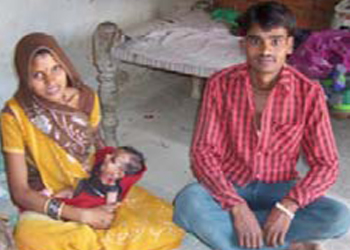
They just wanted to have a baby. For four years they had suffered miscarriage after miscarriage. A Community Health and Development staff worker visited them and suggested they consult Dr. Shalini Ninan at Chhatarpur Christian Hospital. Ghamandi and Parwati had visited other hospitals, but they agreed to the appointment. After the visit, Parwati became pregnant again, and visited the hospital each month to continue treatment. With each passing month, their hope grew. Finally, Parwati safely delivered little Laxmi and their mourning was turned to dancing.
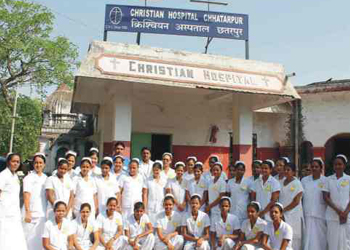
About Chhatarpur Christian Hospital
In 1930, missionaries from the Friends Foreign Missionary Society founded Chhatarpur Christian Hospital to serve the needy women and children in the backward Bundelkhand region of Madhya Pradesh. Today Chhatarpur Christian Hospital is a 100-bed, full-service healthcare facility that provides care in general medicine, obstetrics, gynecology, pediatrics, outpatient services, dentistry, ophthalmology, and surgery. The facility hosts a nursing school where they train students from various parts of North India for future service as nurses, many at Chhatarpur Christian Hospital as well as other EHA hospitals.
The hospital’s mission is to transform the people of Bundelkhand through the provision of good healthcare at an affordable cost, nursing training, and community-based development initiatives. On an average day, the outpatient department handles over one hundred patients, and on a busy day, they may treat up to two hundred. Over the course of a year, Chhatarpur will treat over 6,000 patients. Hospital staff deliver close to 2,000 babies each year, and conduct several thousand eye surgeries each year, mostly for cataracts.
The Community Health & Development Project spearheads many initiatives designed to improve the health and living conditions of over 37,000 people in 33 surrounding villages. The project trains midwives and other health workers to treat people for simple illnesses, to build knowledge of prevalent diseases, and to develop systems to ensure sanitary water. The school health program has taught thousands of school children about common illnesses, good personal hygiene, and the importance of safe water and sanitation. EHA has learned that children often are effective “teachers” of their parents and extended family.
Through all of these programs, Chhatarpur Christian Hospital seeks to improve the lives of the surrounding villagers, enabling them to promote healthy habits and thus to prevent much of their illnesses, all while reaching out to them in love.
